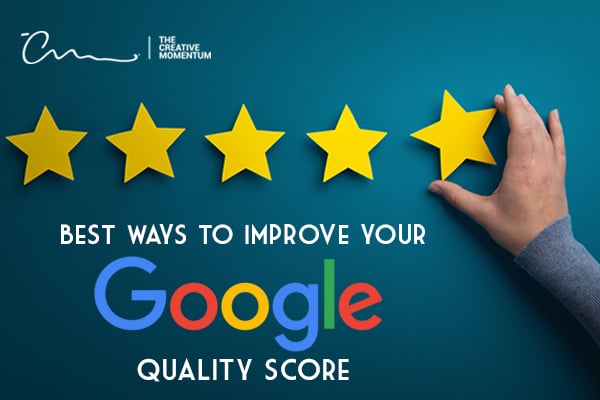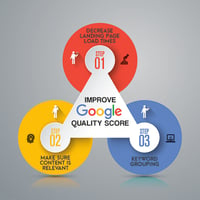
Anyone who’s ever managed a Google Ads campaign has seen a quality score, but it might not always be as high as you hoped. A quality score is a grade for how good your Google ad is. A low score means your ad probably isn’t as effective as it could be. In other words, you’re wasting money on your PPC campaigns.
Every marketer wants more PPC effective ads. Here are a few tricks to improve your Google Quality Score.
What Is Google Quality Score?
The Google Quality Score is Google’s rating method for ad campaigns and indicates how well ads are expected to perform, and it's usually pretty accurate.
Google grades ad campaigns based on three elements:
- Keywords
- Ads
- Landing pages
Your Google Quality Score is a rank between one and ten, with one being the lowest and ten being the highest. If you score a 10/10 Google Quality Score, it means your ads are about as good as they can possibly be!
Why Should You Care About Quality Score?
Of course, you want your Google ads to perform the best they can. If Google itself gives you the “thumbs up,” it should instill confidence. But Google Quality Score does more than just tell you if you’re doing a good job. It can impact your budget, too.
💡 Google’s goal is to provide users with high-quality content. This applies to both the search results and the ads. If Google determines that your ads are high-quality, they’ll reward you.
Google loves quality so much that they’ll give additional promotions and discounts to high-quality ads. So even if your competitor has a much higher bidding budget than you, you can still outrank them with high-quality ads.
A high Google Quality Score is a great way to outrank the competition, reduce your cost per click, and increase acquisitions. Isn’t that what every marketer wants? Studies have shown that a high Google Quality Score can save you up to 50% on your PPC campaigns!
How Google Calculates Quality Score
Google uses three specific metrics to rank PPC ads:
- Expected click-through rate (CTR)
- Ad relevance
- Landing page experience
Each one will impact your overall Google Quality Score, but they’re not all equal. According to research, landing page experience and click-through rate will impact your score more than ad relevance. Here’s what this means in more detail:
Expected Click-Through Rate
Expected click-through rate (CTR) measures the likelihood that someone will click your ad based on keyword performance in the past and ad position. If your ad uses a keyword in a way that has seen success in the past, your Quality Score will soar.
To boost your expected CTR, use keywords that match users’ search queries exactly. The closer you match what users look for, the more likely they are to click on your ad.
Ad Relevance
Ad relevance is another keyword-based metric (can you tell Google likes keywords?). It’s essentially how relevant your ad copy is to the keywords in your ad group.
For example, if you run a landscaping company, you’ll probably want to rank for keywords like “mowing” and “landscaping.” To save time, you might link a single PPC ad to both keywords. While it might be efficient, how relevant could that ad be to both keywords? They’re two very different services!
The best way to ensure ad relevance is to keep your keyword groups specific and create different, highly-relevant ads for each group. If you want to rank for both “landscaping” and “mowing,” create a different PPC ad for each.
Landing Page Experience
Landing page experience is similar to ad relevance, except for your landing page. It’s a measurement of how clear, useful, and relevant your landing page is for people who click your ad.
If your ad says, “Learn how to speak Spanish in a week,” your landing page should explain how your service will help customers do exactly that and the next steps to take. Linking to a generic page about all the languages you can teach them isn’t relevant to the ad they just clicked.
Personalize each landing page for the ad promise and the audience you hope to attract. It’s also a good idea to use the ad keyword in your headline and throughout the page.
How to Improve Google Quality Score
 If your Google Quality Score isn’t so great, there are a few things you can do to improve your score. Most of it has to do with choosing the right keywords and making sure everything is relevant to the user between the keywords, ad, and landing pages. Here are three tips to improve your Google Quality Score for your PPC ads:
If your Google Quality Score isn’t so great, there are a few things you can do to improve your score. Most of it has to do with choosing the right keywords and making sure everything is relevant to the user between the keywords, ad, and landing pages. Here are three tips to improve your Google Quality Score for your PPC ads:
1. Decrease Landing Page Load Times
The internet is all about instant gratification. If a user clicks on your ad and has to wait for the page to load, there’s a good chance she’ll close the window and head over to a competitor.
According to research, 53% of people leave a page if it takes longer than three seconds to load. If people don’t stay on your landing pages, your estimated click-through rates will tank, along with your Google Quality Score.
The best way to increase landing page load times is to remove “weighty” elements like high-resolution images or excess JavaScript. Having one or two images is a good idea, but more than that will slow load times. Keep landing pages short and simple for optimal results.
2. Make Sure Content Is Relevant
From the keywords to the ad copy and throughout the landing page, all the content should be relevant to the specific ad campaign. Don’t link to a homepage, generic service page, or any other page that’s not 100% related to the ad.
The more that visitors have to search for the information they want, the less likely they’ll be to stick around. Keep information relevant throughout your ad campaign to boost your ad relevance and click-through rates and, therefore, your Google Quality Score.
3. Keyword Grouping
Large, broad keyword groups will hurt your ad relevance and make it harder to achieve a high Google Quality Score. Keep your keyword groups small and specific, with unique ads for each group.
For example, imagine you run a footwear company. You might want to create an ad that ranks for keywords like shoes, socks, and insoles. Each of those keywords is very different. Creating a single ad that encompasses all of them would decrease the relevance of your ad.
Instead, split your various products and services into smaller keyword groups. In the “sock” keyword group, you could include “dress socks,” “athletic socks,” and “hiking socks.” Then, create a sock-specific ad for the group. Building separate landing pages might be extra work, but it’ll ensure relevance between your ad, keywords, and landing page to boost your Google Quality Score.
Maximize Your Google Quality Score
Creating the perfect Google Ad campaign is all about optimizing your Google Quality Score. The higher your score, the more effective (and cost-effective) your PPC campaign will be.
If you need help with your Google Ad Campaigns, we can execute all your digital marketing needs from professional landing pages to fully managed PPC campaigns. Contact us to start working on your next high-scoring Google Ad.



